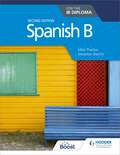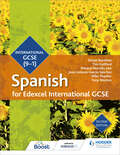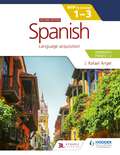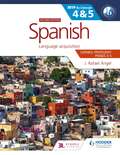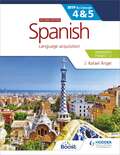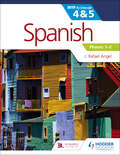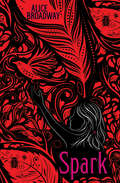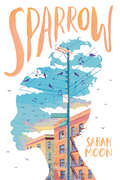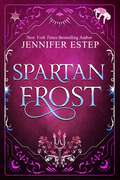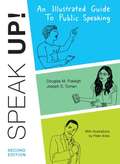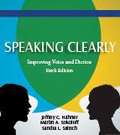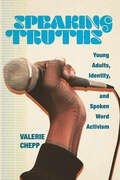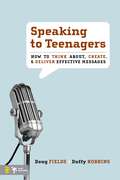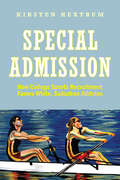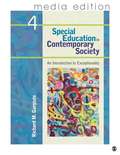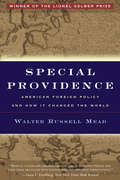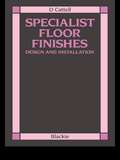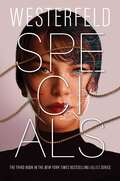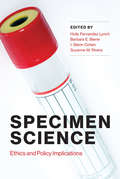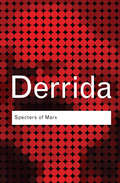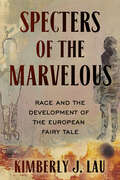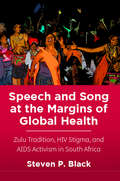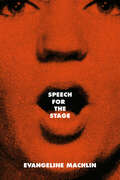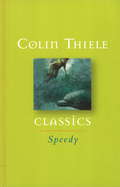- Table View
- List View
Spanish B for the IB Diploma Second Edition
by Mike Thacker Sebastian BianchiExam board: International BaccalaureateLevel: IB DiplomaSubject: SpanishFirst teaching: September 2018First exams: Summer 2020Develop competent communicators who can demonstrate a sound conceptual understanding of the language with a flexible course that ensures thorough coverage of the updated Spanish B Guide and is designed to meet the needs of all IB students at Standard and Higher Level.- Empower students to communicate confidently by exploring the five prescribed themes through authentic texts and skills practice at the right level, delivered in clear learning pathways. - Ensure students are able to produce coherent written texts and deliver proficient presentations with grammar and vocabulary introduced in context and in relation to appropriate spoken and written registers. - Improve receptive skills with authentic written texts, audio recordings spoken at a natural pace, and carefully crafted reading and listening tasks.- Promote global citizenship, intercultural understanding and an appreciation of Hispanic cultures through a wide range of text types and cultural material from around the world. - Deliver effective practice with a range of structured tasks within each unit that build reading, listening, speaking and writing skills.- Establish meaningful links to TOK and CAS, and identify learner profile attributes in action.The audio for the Student Book is FREE to download from www.hoddereducation.com/ibextras
Spanish for Edexcel International GCSE, Second Edition
by Mónica Morcillo Laiz Simon Barefoot Timothy GuilfordThis Student Book provides a grammar-led approach with extensive exam preparation to develop independent, culturally aware students of Spanish, ready for the exam.This book is endorsed by Cambridge International Examinations for the latest IGCSE® (0525) and International Level 1/Level 2 Certificate (0677) syllabuses. Extensive use of Spanish reflects the style of the exams and, with specific advice and practice, it helps students use the acquired skills to their best ability. Topics on Spanish-speaking cultures are integrated throughout to ensure students gain the cultural awareness that is at the heart of this qualification. The book provides up-to-date content following a clear sequencing of topics designed specifically for teaching Spanish at this level. It is designed to develop spontaneous, confident linguists who are able to progress to further study of Spanish.
Spanish for the IB MYP 1-3 (Emergent/Phases 1-2) (Emergent/Phases 1-2) (Emergent/Phases 1-2) (Emergent/Phases 1-2): MYP by Concept Second edition: By Concept
by J. Rafael AngelDevelop your skills to become an inquiring learner; ensure you navigate the MYP framework with confidence using a concept-driven and assessment-focused approach to Spanish, presented in global contexts.- Develop conceptual understanding with key MYP concepts and related concepts at the heart of each chapter. - Learn by asking questions for a statement of inquiry in each chapter. - Prepare for every aspect of assessment using support and tasks designed by experienced educators.- Understand how to extend your learning through research projects and interdisciplinary opportunities.- Think internationally with chapters and concepts set in global contexts.
Spanish for the IB MYP 4&5 (Capable-Proficient/Phases 3-4, 5-6) (Capable-Proficient/Phases 3-4, 5-6) (Capable-Proficient/Phases 3-4, 5-6) (Capable-Proficient/Phases 3-4, 5-6) (Capable-Proficient/Phases 3-4, 5-6) (Capable-Proficient/Phases 3-4, 5-6) (Capable-Proficient/Phases 3-4, 5-6) (Capable-Proficient/Phases 3-4, 5-6): MYP by Concept Second edition: By Concept
by J. Rafael AngelDevelop your skills to become an inquiring learner; ensure you navigate the MYP framework with confidence using a concept-driven and assessment-focused approach to Spanish, presented in global contexts.- Develop conceptual understanding with key MYP concepts and related concepts at the heart of each chapter. - Learn by asking questions for a statement of inquiry in each chapter. - Prepare for every aspect of assessment using support and tasks designed by experienced educators.- Understand how to extend your learning through research projects and interdisciplinary opportunities.- Think internationally with chapters and concepts set in global contexts.
Spanish for the IB MYP 4&5 (Emergent/Phases 1-2) (Emergent/Phases 1-2) (Emergent/Phases 1-2) (Emergent/Phases 1-2) (Emergent/Phases 1-2) (Emergent/Phases 1-2) (Emergent/Phases 1-2) (Emergent/Phases 1-2): MYP by Concept Second edition: By Concept
by J. Rafael AngelDevelop your skills to become an inquiring learner; ensure you navigate the MYP framework with confidence using a concept-driven and assessment-focused approach to (insert subject), presented in global contexts.- Develop conceptual understanding with key MYP concepts and related concepts at the heart of each chapter. - Learn by asking questions for a statement of inquiry in each chapter. - Prepare for every aspect of assessment using support and tasks designed by experienced educators.- Understand how to extend your learning through research projects and interdisciplinary opportunities.- Think internationally with chapters and concepts set in global contexts.
Spanish for the IB MYP 4&5 Phases 1-2: Phases 1-2
by J. Rafael AngelEndorsed by the IBDrive meaningful inquiry through a unique concept-driven narrative.- Supports every aspect of assessment with opportunities that use the criteria- Gives you easy ways to differentiate and extend learning- Provides a meaningful approach by integrating the inquiry statement in a global context- Develops critical-thinking skills with activities and summative sections rooted in the ATL framework
Spark (Ink Trilogy, Book 2)
by Alice BroadwayAlice Broadway returns with the stunning sequel to her international bestseller Ink!After her reckless actions at the naming ceremony, Leora is branded a traitor and sent to the blank settlement, Featherstone, as a spy disguised as a refugee.But Leora is no longer sure where her loyalty lies. The blanks are just people trying to survive, not the monsters she was trained to see them as. After all these years of deception, Leora is finally learning the truth -- about being marked, about her mother, and about her own destiny. But if Leora stops spying, the people she left behind in Saintstone will pay the price.No matter what she does, someone she loves is going to get hurt. As the marked and the blanks inch closer to the brink of war, Leora must choose which half of herself to be true to . . . and which half to betray.
Sparrow (Arthur A Levine Novel Bks.)
by Sarah MoonThe story of a sensitive, gifted African American girl who tells us with mordant humor what it feels like to spend every day wishing so hard that you could fly away from it allSparrow has always had a difficult time making friends. She would always rather stay home on the weekends with her mother, an affluent IT executive at a Manhattan bank, reading, or watching the birds, than play with other kids. And that's made school a lonely experience for her. It's made LIFE a lonely experience.But when the one teacher who really understood her -- Mrs. Wexler, the school librarian, a woman who let her eat her lunch in the library office rather than hide in a bathroom stall, a woman who shared her passion for novels and knew just the ones she'd love -- is killed in a freak car accident, Sparrow's world unravels and she's found on the roof of her school in an apparent suicide attempt.With the help of an insightful therapist, Sparrow finally reveals the truth of her inner life. And it's here that she discovers an outlet in rock & roll music...
Spartan Frost (The Mythos Academy)
by Jennifer EstepA Spartan warrior-in-training decides to leave school—and the girl he loves—in this fantasy novella by the New York Times bestselling author. I'm Logan Quinn, the deadliest Spartan warrior at Mythos Academy. At least I was—until the day I almost killed Gwen Frost. Professor Metis and Nickamedes say that I'm fine, that Loki and the Reapers don't have a hold on me anymore, but I can't risk it. I can't risk hurting Gwen again. So I'm leaving Mythos and going somewhere far, far away. I know Gwen wonders what's happening to me, whether I'm safe. I can't tell her, but this is my story.
Spatial Data Quality
by Peter Fisher Wenzhong Shi Michael F. GoodchildAs research in the geosciences and social sciences becomes increasingly dependent on computers, applications such as geographical information systems are becoming indispensable tools. But the digital representations of phenomena that these systems require are often of poor quality, leading to inaccurate results, uncertainty, error propagation, and
Speak Up: An Illustrated Guide To Public Speaking
by Douglas M. Fraleigh Joseph S. TumanSmart, compelling, fun, and affordable,Speak Up connects with students through great writing, useful guidance, and hundreds of custom-drawn illustrations that bring speech to life. Instructors appreciate the book's serious coverage of concepts and theories, fascinating real-life examples, and visual explanations that clarify complex ideas. And all this comes at less than half the price of competing texts.
Speaking Clearly: Improving Voice and Diction (Sixth Edition)
by Jeffrey C. Hahner Martin A. Sokoloff Sandra L. SalischSpeaking Truths: Young Adults, Identity, and Spoken Word Activism
by Valerie CheppThe twenty-first century is already riddled with protests demanding social justice, and in every instance, young people are leading the charge. But in addition to protesters who take to the streets with handmade placards are young adults who engage in less obvious change-making tactics. In Speaking Truths, sociologist Valerie Chepp goes behind-the-scenes to uncover how spoken word poetry—and young people’s participation in it—contributes to a broader understanding of contemporary social justice activism, including this generation’s attention to the political importance of identity, well-being, and love. Drawing upon detailed observations and in-depth interviews, Chepp tells the story of a diverse group of young adults from Washington, D.C. who use spoken word to create a more just and equitable world. Outlining the contours of this approach, she interrogates spoken word activism’s emphasis on personal storytelling and “truth,” the strategic uses of aesthetics and emotions to politically engage across difference, and the significance of healing in sustainable movements for change. Weaving together their poetry and personally told stories, Chepp shows how poets tap into the beautiful, emotional, personal, and therapeutic features of spoken word to empathically connect with others, advance intersectional and systemic analyses of inequality, and make social justice messages relatable across a diverse public. By creating allies and forging connections based on friendship, professional commitments, lived experiences, emotions, artistic kinship, and political views, this activist approach is highly integrated into the everyday lives of its practitioners, online and face-to-face. Chepp argues that spoken word activism is a product of, and a call to action against, the neoliberal era in which poets have come of age, characterized by widening structural inequalities and increasing economic and social vulnerability. She illustrates how this deeply personal and intimate activist approach borrows from, builds upon, and diverges from previous social movement paradigms. Spotlighting the complexity and mutual influence of modern-day activism and the world in which it unfolds, Speaking Truths contributes to our understanding of contemporary social change-making and how neoliberalism has shaped this political generation’s experiences with social injustice.
Speaking to Teenagers: How to Think About, Create, and Deliver Effective Messages
by Doug Fields Duffy RobbinsGet ready for a crash course in effective communication. More than just a book on how to "do talks," Speaking to Teenagers combines the experience and wisdom of two veteran youth ministry speakers, along with insightful research and practical tools, to help you develop messages that engage students with the love of Christ and the power of his Word. Whether you¹re crafting a five-minute devotional or a 30-minute sermon, Speaking to Teenagers is essential to understanding and preparing great messages. Together, Doug Fields and Duffy Robbins show you how they craft their own messages and give you the tools to do it yourself. They'll guide you, step-by-step, through the process of preparing and delivering meaningful messages that effectively communicate to your students. Fields and Robbins walk you through three dimensions of a message - the speaker, the listener, and the message itself‹and introduce you to the concept and principles of inductive communication. You¹ll also get helpful tips on finding illustrations for your talk and using them for maximum impact, as well as insights on reading your audience and effective body language. As Speaking to Teenagers guides you toward becoming a more effective communicator, you'll find that this book's practical principles will positively impact the way you view, treat, and communicate to teenagers.
Special Admission: How College Sports Recruitment Favors White Suburban Athletes (The American Campus)
by Kirsten HextrumSpecial Admission contradicts the national belief that college sports provide upward mobility opportunities. Kirsten Hextrum documents how white middle-class youth become overrepresented on college teams. Her institutional ethnography of one elite athletic and academic institution includes over 100 hours of interviews with college rowers and track & field athletes. She charts the historic and contemporary relationships between colleges, athletics, and white middle-class communities that ensure white suburban youth are advantaged in special athletic admissions. Suburban youth start ahead in college admissions because athletic merit—the competencies desired by university recruiters—requires access to vast familial, communal, and economic resources, all of which are concentrated in their neighborhoods. Their advantages increase as youth, parents, and coaches strategically invest in and engineer novel opportunities to maintain their race and class status. Thus, college sports allow white, middle-class athletes to accelerate their racial and economic advantages through admission to elite universities.
Special Education in Contemporary Society: An Introduction to Exceptionality (4th Edition)
by Richard M. GargiuloSpecial Education in Contemporary Society is first and foremost a textbook about people - individuals, who in many ways are very similar to their peers without a disability. This book serves as a comprehensive introduction to the dynamic field of special education and the children and young adults who benefit from receiving a special education.
Special Providence: American Foreign Policy and How It Changed the World
by Walter Russell Mead"God has a special providence for fools, drunks and the United States of America."--Otto von BismarckAmerica's response to the September 11 attacks spotlighted many of the country's longstanding goals on the world stage: to protect liberty at home, to secure America's economic interests, to spread democracy in totalitarian regimes and to vanquish the enemy utterly.One of America's leading foreign policy thinkers, Walter Russell Mead, argues that these diverse, conflicting impulses have in fact been the key to the U.S.'s success in the world. In a sweeping new synthesis, Mead uncovers four distinct historical patterns in foreign policy, each exemplified by a towering figure from our past.Wilsonians are moral missionaries, making the world safe for democracy by creating international watchdogs like the U.N. Hamiltonians likewise support international engagement, but their goal is to open foreign markets and expand the economy. Populist Jacksonians support a strong military, one that should be used rarely, but then with overwhelming force to bring the enemy to its knees. Jeffersonians, concerned primarily with liberty at home, are suspicious of both big military and large-scale international projects.A striking new vision of America's place in the world, Special Providence transcends stale debates about realists vs. idealists and hawks vs. doves to provide a revolutionary, nuanced, historically-grounded view of American foreign policy.
Specialist Floor Finishes: Design and Installation
by D CattellFirst Published in 1989. Routledge is an imprint of Taylor & Francis, an informa company.
Specials: Uglies; Pretties; Specials; Extras (Uglies #3)
by Scott WesterfeldThe third installment of Scott Westerfeld&’s New York Times bestselling and award-winning Uglies series—a global phenomenon that started the dystopian trend.Tally thought they were a rumor, but now she&’s one of them. A Special. A super-amped fighting machine, engineered to keep the uglies down and the pretties stupid. But maybe being perfectly programmed with strength and focus isn&’t better than anything she&’s ever known. Tally still has memories of something else. Still, it&’s easy to tune that out—until she&’s offered a chance to stamp out the rebels of the New Smoke permanently. It all comes down to one last choice: listen to that tiny, faint heartbeat, or carry out the mission she&’s programmed to complete. Either way, Tally&’s world will never be the same.
Specimen Science: Ethics and Policy Implications (Basic Bioethics)
by Holly Lynch Barbara Bierer I. Cohen Suzanne RiveraLegal, regulatory, and ethical perspectives on balancing social benefit and human autonomy in research using human biospecimens.Advances in medicine often depend on the effective collection, storage, research use, and sharing of human biological specimens and associated data. But what about the sources of such specimens? When a blood specimen is drawn from a vein in your arm, is that specimen still you? Is it your property, intellectual or otherwise? Should you be allowed not only to consent to its use in research but also to specify under what circumstances it may be used? These and other questions are at the center of a vigorous debate over the use of human biospecimens in research. In this book, experts offer legal, regulatory, and ethical perspectives on balancing social benefit and human autonomy in biospecimen research.After discussing the background to current debates as well as several influential cases, including that of Henrietta Lacks, the contributors consider the rights, obligations, risks, and privacy of the specimen source; different types of informed consent under consideration (broad, blanket, and specific); implications for special patient and researcher communities; and the governance of biospecimen repositories and the responsibilities of investigators.ContributorsRebecca A. Anderson, Heide Aungs, Avery Avrakotos, Mark Barnes, Jill Barnholtz-Sloan, Benjamin Berkman, Barbara E. Bierer, Mark A. Borreliz, Jeffrey R. Botkin, Dan Brock, Ellen Wright Clayton, I. Glenn Cohen, Lisa Eckstein, Barbara J. Evans, Emily Chi Fogler, Nanibaa' A. Garrison, Pamela Gavin, Aaron J. Goldenberg, Christine Grady, Kate Gallin Heffernan, Marylana Saadeh Helou, Sara Chandros Hull, Elisa A. Hurley, Steven Joffe, Erin P. Johnson, Julie Kaneshiro, Aaron S. Kesselheim, Isaac Kohane, David Korn, Russell Korobkin, Bernard Lo, Geoffrey Lomax, Kimberly Hensle Lowrance, Holly Fernandez Lynch, Bradley A. Malin, Karen J. Maschke, Eric M. Meslin, P. Pearl O'Rourke, Quinn T. Ostrom, David Peloquin, Rebecca Pentz, Jane Perlmutter, Ivor Pritchard, Suzanne M. Rivera, Erin Rothwell, Andrew P. Rusczek, Rachel E. Sachs, Carol Weil, David Wendler, Benjamin Wilfond, Susan M. Wolf
Specters of Marx: The State of the Debt, the Work of Mourning and the New International
by Jacques DerridaProdigiously influential, Jacques Derrida gave rise to a comprehensive rethinking of the basic concepts and categories of Western philosophy in the latter part of the twentieth century, with writings central to our understanding of language, meaning, identity, ethics and values. In 1993, a conference was organized around the question, 'Whither Marxism?’, and Derrida was invited to open the proceedings. His plenary address, 'Specters of Marx', delivered in two parts, forms the basis of this book. Hotly debated when it was first published, a rapidly changing world and world politics have scarcely dented the relevance of this book.
Specters of the Marvelous: Race and the Development of the European Fairy Tale (The Donald Haase Series in Fairy-Tale Studies)
by Kimberly J. LauA transformative lens revealing the historical racial context that profoundly influenced European fairy tales. In stories retold for generations, wondrous worlds and magnificent characters have defined the genre of European fairy tales with little recognition of yet another defining aspect—racism and racialized thinking. Engaging four classic fairy-tale collections, author Kimberly J. Lau connects close readings of the tales to the cultural discourses, scholarly debates, and imperial geopolitics that established and perpetuated ideas about racial difference and white superiority. Within the tales of Giambattista Basile, Marie-Catherine d'Aulnoy, the Grimms, and Andrew and Nora Lang, Lau teases apart and historicizes the racialized themes and ideologies embedded within fairy tales spanning the early seventeenth to early twentieth centuries. She contends that the European fairy tale is definitively marked, whether implicitly or explicitly, by whiteness, and given the genre's documented colonization of diverse narrative traditions over time, this specter of race is all the more haunting. This trailblazing work demonstrates the continuous evolution of racialized thinking that has informed the publication and dissemination of fairy tales. Here, Lau provides a new framework for understanding European fairy tales in the milieux in which they were created, bringing distant and ethereal worlds back to earth.
Speech and Song at the Margins of Global Health: Zulu Tradition, HIV Stigma, and AIDS Activism in South Africa
by Steven P. BlackSpeech and Song at the Margins of Global Health tells the story of a unique Zulu gospel choir comprised of people living with HIV in South Africa, and how they maintained healthy, productive lives amid globalized inequality, international aid, and the stigma that often comes with having HIV. By singing, joking, and narrating about HIV in Zulu, the performers in the choir were able to engage with international audiences, connect with global health professionals, and also maintain traditional familial respect through the prism of performance. The focus on gospel singing in the narrative provides a holistic viewpoint on life with HIV in the later years of the pandemic, and the author’s musical engagement led to fieldwork in participants’ homes and communities, including the larger stigmatized community of infected individuals. This viewpoint suggests overlooked ways that aid recipients contribute to global health in support, counseling, and activism, as the performers set up instruments, waited around in hotel lobbies, and struck up conversations with passersby and audience members. The story of the choir reveals the complexity and inequities of global health interventions, but also the positive impact of those interventions in the crafting of community.
Speech for the Stage
by Evangeline MachlinFrom its original publication, thousands of actors have used this classic text to develop and refine their voice and speech. Evangeline Machlin includes warm-up routines for the voice but initially focuses on the importance of listening. She also discusses such important elements as relaxation, phonetics, articulation, resonance, pitch, rate of speech and stress. In addition, there are chapters on dialects, on reading aloud, sight reading, auditioning and performance.
Speedy
by Robert Ingpen Colin ThieleA heartwarming adventure from Australia?s master storyteller.Speedy is the fastest, cleverest dolphin ever to swim the waters around Kangaroo Island. To ten-year-old Mike and his fisherman father Ben, he is also a very special friend, always there to meet their boat and lead her home into the harbour. Speedy soon becomes a tourist attraction in their small fishing town. But not everyone loves him as much as Ben and his friend Sally, and one day they realise that the friendly dolphin is in deadly danger.
